| Listing 1 - 10 of 12 | << page >> |
Sort by
|
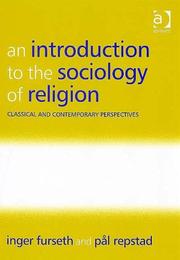
ISBN: 1138468312 1315262649 128109790X 9786611097905 075468251X 9780754682516 9780754656531 0754656535 9780754656586 0754656586 0754656535 0754656586 1351958666 Year: 2006 Publisher: Aldershot, England Burlington, VT Ashgate
Abstract | Keywords | Export | Availability | Bookmark
 Loading...
Loading...Choose an application
- Reference Manager
- EndNote
- RefWorks (Direct export to RefWorks)
An Introduction to the Sociology of Religion provides an overview of sociological theories of contemporary religious life. Some chapters are organized according to topic. Others offer brief presentations of classical and contemporary sociologists from Karl Marx to Zygmunt Bauman and their perspectives on social life, including religion. Throughout the book, illustrations and examples are taken from several religious traditions.
Religion and sociology. --- Religion and society --- Religious sociology --- Society and religion --- Sociology, Religious --- Sociology and religion --- Sociology of religion --- Sociology

ISBN: 0754656535 0754656586 9780754656586 9780754656531 9781315262642 9781351958653 9781138468313 Year: 2006 Publisher: Aldershot Ashgate
Abstract | Keywords | Export | Availability | Bookmark
 Loading...
Loading...Choose an application
- Reference Manager
- EndNote
- RefWorks (Direct export to RefWorks)
Religion and sociology. --- Sociology of religion --- 316:2 --- 316:2 Godsdienstsociologie --- Godsdienstsociologie --- Religion and society --- Religious sociology --- Society and religion --- Sociology, Religious --- Sociology and religion --- Sociology --- Sociologie religieuse --- Religion and sociology
Book
ISBN: 9021141051 9789021141053 Year: 2006 Publisher: Zoetermeer Meinema
Abstract | Keywords | Export | Availability | Bookmark
 Loading...
Loading...Choose an application
- Reference Manager
- EndNote
- RefWorks (Direct export to RefWorks)
Religion and sociology --- 291.3 --- Religion and society --- Religious sociology --- Society and religion --- Sociology, Religious --- Sociology and religion --- Sociology of religion --- Sociology --- 291.3 Godsdienstwetenschap: cultus; liturgie --- Godsdienstwetenschap: cultus; liturgie --- Christian pastoral theology --- Liturgy
Book
ISBN: 1281376906 9786611376901 1423769090 9781423769095 Year: 2006 Publisher: Budapest New York Central European University Press
Abstract | Keywords | Export | Availability | Bookmark
 Loading...
Loading...Choose an application
- Reference Manager
- EndNote
- RefWorks (Direct export to RefWorks)
Religion and state --- Islam --- Religion and sociology --- Church and state --- HISTORY --- Europe / General --- Christianity and state --- Separation of church and state --- State and church --- State, The --- Religion and society --- Religious sociology --- Society and religion --- Sociology, Religious --- Sociology and religion --- Sociology of religion --- Sociology --- Mohammedanism --- Muhammadanism --- Muslimism --- Mussulmanism --- Religions --- Muslims --- State and religion --- Religious aspects --- European Union countries --- EU countries --- Euroland --- Europe --- Religion. --- European cooperation. --- European federation.
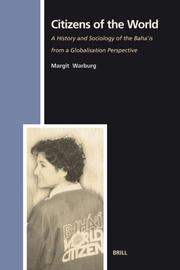
ISSN: 15709434 ISBN: 9789004143739 9004143734 9789047407461 9047407466 1281396672 9786611396671 Year: 2006 Volume: 106. Publisher: Leiden ; Brill
Abstract | Keywords | Export | Availability | Bookmark
 Loading...
Loading...Choose an application
- Reference Manager
- EndNote
- RefWorks (Direct export to RefWorks)
Citizens of the World deals with the Baha’is and their religion. While covering the historical development in sufficient detail to serve as a general monograph on Baha’i, emphasis is laid on examining contemporary Baha’i, with the Danish Baha’i community as a recurrent case. The book discusses Baha’i religious texts, rituals, economy, everyday life, demographic development, mission strategies, leadership, and international activism in analyses based on primary material, such as interview studies among the Baha’is, fieldwork data from the Baha’i World Centre in Israel, and field trips around the world. The approach is a combination of history of religions and sociology of religion within a theoretical framework of religion and globalisation. Several general topics in the study of new religions are covered. The book contributes to the theoretical study of globalisation by proposing a new model for analysing globalisation and transnational religions.
Globalization --- Bahai Faith --- Religion and sociology. --- Mondialisation --- Foi bahaïe --- Sociologie religieuse --- Religious aspects --- Bahai Faith. --- History. --- Aspect religieux --- Histoire --- Religion and sociology --- History --- 298.8 --- #SBIB:316.331H450 --- Religion and society --- Religious sociology --- Society and religion --- Sociology, Religious --- Sociology and religion --- Sociology of religion --- Sociology --- Global cities --- Globalisation --- Internationalization --- International relations --- Anti-globalization movement --- Babisme. Bahaïsme --- Morfologie van de godsdiensten: religieuze bewegingen en sekten --- 298.8 Babisme. Bahaïsme --- Foi bahaïe --- Religious aspects&delete& --- Bahaism --- Religions --- Babism --- Globalization - Religious aspects - Bahai Faith --- Bahai Faith - History
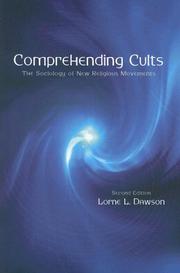
ISBN: 9780195420098 0195240098 0195420098 Year: 2006 Publisher: Don Mills Oxford University Press
Abstract | Keywords | Export | Availability | Bookmark
 Loading...
Loading...Choose an application
- Reference Manager
- EndNote
- RefWorks (Direct export to RefWorks)
Cults --- Religion and sociology --- Social aspects --- -Cults --- -Religion and sociology --- -298.9 --- Religion and society --- Religious sociology --- Society and religion --- Sociology, Religious --- Sociology and religion --- Sociology of religion --- Sociology --- Alternative religious movements --- Cult --- Cultus --- Marginal religious movements --- New religions --- New religious movements --- NRMs (Religion) --- Religious movements, Alternative --- Religious movements, Marginal --- Religious movements, New --- Religions --- Sects --- -Social aspects --- -Recente niet-christelijke of afgeleid-christelijke religies; New Age --- 298.9 Recente niet-christelijke of afgeleid-christelijke religies; New Age --- Recente niet-christelijke of afgeleid-christelijke religies; New Age --- 298.9 --- Cults - Social aspects - United States. --- Cults - Social aspects - Canada. --- Cults - United States. --- Cults - Canada. --- Religion and sociology - United States. --- Religion and sociology - Canada.
Book
ISBN: 1920942483 1920942475 9781920942489 9781920942472 Year: 2006 Publisher: Canberra, [Australia] : ANU E Press,
Abstract | Keywords | Export | Availability | Bookmark
 Loading...
Loading...Choose an application
- Reference Manager
- EndNote
- RefWorks (Direct export to RefWorks)
This cross-disciplinary exploration of the role of the sacred, blasphemy and sacrilege in a multicultural society brings together philosophers, theologians, lawyers, historians, curators, anthropologists and sociologists, as well as Christian, Jewish and Islamic and secular perspectives. In bringing together different disciplinary and cultural approaches, the book provides a way of broadening our conceptions of what might count as sacred, sacrilegious and blasphemous, in moral and political terms. In addition, it provides original research data on blasphemy, sacrilege and religious tolerance from a range of disciplines.
Religion and sociology --- Offenses against religion --- Blasphemy --- Sacrilege --- Religion --- Philosophy & Religion --- Religion - General --- Religion and sociology. --- Offenses against religion. --- Blasphemy. --- Crimes against religion --- Offenses, Religious --- Religious crimes --- Religious offenses --- Religion and society --- Religious sociology --- Society and religion --- Sociology, Religious --- Sociology and religion --- Sociology of religion --- Freedom of speech --- Libel and slander --- Crime --- Sociology --- Multiculturalism. --- Sacrilege. --- Church desecration --- Desecration --- Host desecration accusation --- Taboo --- Pluralism (Social sciences) --- Cultural pluralism --- Cultural diversity policy --- Cultural pluralism policy --- Ethnic diversity policy --- Multiculturalism --- Social policy --- Anti-racism --- Ethnicity --- Cultural fusion --- Government policy
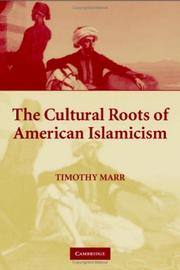
ISBN: 052161807X 9780521618076 0521852935 9780521852937 Year: 2006 Publisher: New York Cambridge University Press
Abstract | Keywords | Export | Availability | Bookmark
 Loading...
Loading...Choose an application
- Reference Manager
- EndNote
- RefWorks (Direct export to RefWorks)
In this cultural history of Americans' engagement with Islam in the colonial and antebellum period, Timothy Marr analyzes the historical roots of how the Muslim world figured in American prophecy, politics, reform, fiction, art and dress. Marr argues that perceptions of the Muslim world, long viewed not only as both an anti-Christian and despotic threat but also as an exotic other, held a larger place in domestic American concerns than previously thought. Historical, literary, and imagined encounters with Muslim history and practices provided a backdrop where different Americans oriented the direction of their national project, the morality of the social institutions, and the contours of their romantic imaginations. This history sits as an important background to help understand present conflicts between the Muslim world and the United States.
Islam --- Orientalism --- Public opinion --- Islam and politics --- Religion and sociology --- 908 <73> --- Religion and society --- Religious sociology --- Society and religion --- Sociology, Religious --- Sociology and religion --- Sociology of religion --- Sociology --- Politics and Islam --- Political science --- East and West --- Mohammedanism --- Muhammadanism --- Muslimism --- Mussulmanism --- Religions --- Muslims --- History. --- Heemkunde. Area studies--Verenigde Staten van Amerika. VSA. USA --- Political aspects --- United States --- Islamic countries --- Muslim countries --- Civilization --- Foreign public opinion, American. --- Relations --- Intellectual life --- 908 <73> Heemkunde. Area studies--Verenigde Staten van Amerika. VSA. USA --- History --- Public opinion&delete&
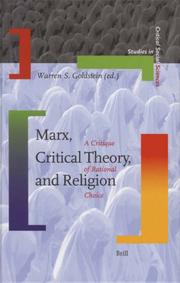
ISBN: 9004152385 9786611400033 1281400033 9047410181 9789004152380 9789047410188 9781281400031 6611400036 Year: 2006 Volume: 6 Publisher: Leiden Boston Brill
Abstract | Keywords | Export | Availability | Bookmark
 Loading...
Loading...Choose an application
- Reference Manager
- EndNote
- RefWorks (Direct export to RefWorks)
The Sociology of Religion has had several frameworks guiding its analysis including functionalism, interpretive sociology, phenomenology, symbolic interactionism and now rational choice theory. Marxism has tended to ignore religion assuming it is something that would eventually disappear even though it retained theological elements. This collection of essays brings together a group of scholars who use frameworks provided by Marx and Critical Theory in analyzing religion. It's goal is to establish a critical theory of religion within the sociology of religion as an alternative to rational choice. In doing so, it engages in a critique of the positivism, uncritical praise of the market (neoconservativism) and one dimensional conception of rationality of the rational choice theory of religion.
Choix rationnel [Théorie du ] --- Critical theory --- Godsdienst en maatschappij --- Godsdienst en sociologie --- Godsdienst--Sociologie --- Godsdienstsociologie --- Keuzetheorie [Rationele ] --- Kritische theorie --- Maatschappij en godsdienst --- Rational choice theory --- Rationele keuzetheorie --- Religion and society --- Religion and sociology --- Religion et sociologie --- Religion et société --- Religion--Sociologie --- Religious sociology --- Society and religion --- Sociologie [Godsdienst] --- Sociologie de la religion --- Sociologie en godsdienst --- Sociologie et religion --- Sociologie van de godsdienst --- Sociology [Religious ] --- Sociology and religion --- Sociology of religion --- Société et religion --- Théorie critique --- Marx, Karl, --- Critical theory. --- Rational choice theory. --- Religion and sociology. --- Sociology, Religious --- Sociology --- Social choice --- Critical social theory --- Critical theory (Philosophy) --- Critical theory (Sociology) --- Negative philosophy --- Criticism (Philosophy) --- Philosophy, Modern --- Rationalism --- Frankfurt school of sociology --- Socialism --- Marx, Karl --- Makesi, --- Ma-kʻo-ssu, --- 马克思, --- 馬克思, --- Marukusu, --- マルクス, --- Marx, Heinrich Karl, --- Marks, Karl, --- Marx, Carlos, --- Marks, K. --- Marŭkʻŭsŭ, Kʻal, --- 마르크스, 칼, --- Marksŭ, --- 맑스, --- Marks, Karol, --- Mác, Các, --- Marx, Karel, --- Marksas, Karolis, --- Marx, Carlo, --- Mác, C., --- מארכס, --- מארכס, קארל, --- מארכס, קרל, --- מארכס, ק --- מארקס --- מארקס, קארל --- מארקס, קארל, --- מארקס, קרל, --- מארקס, ק. --- מרכס, קרל --- מרכס, קרל, --- ماركس، كارل --- ماركس، كارل، --- Markso, Karlo, --- Marx, Karl, - 1818-1883
Book
ISBN: 9028942211 9789028942219 9077070893 9789077070895 Year: 2006 Publisher: Kampen Klement/Pelckmans
Abstract | Keywords | Export | Availability | Bookmark
 Loading...
Loading...Choose an application
- Reference Manager
- EndNote
- RefWorks (Direct export to RefWorks)
Philosophy and psychology of culture --- Religious studies --- Godsdienst en cultuur --- Religion and culture --- Religion et culture --- Religion --- Religion and sociology --- Philosophy --- 261.6 --- #gsdb3 --- #GGSB: Filosofie --- #GGSB: Religie (alg. - niet chr.) --- #GGSB: Cultuurfilosofie --- C3 --- religie --- cultuur --- maatschappij --- godsbeeld --- De Kerk en de cultuur: christelijke beschaving; Kerk en vooruitgang; Kerk en wereld --- Kunst en cultuur --- Religion and culture. --- Religion and sociology. --- Philosophy. --- 261.6 De Kerk en de cultuur: christelijke beschaving; Kerk en vooruitgang; Kerk en wereld --- Religion and society --- Religious sociology --- Society and religion --- Sociology, Religious --- Sociology and religion --- Sociology of religion --- Sociology --- Culture and religion --- Culture --- Cultuurfilosofie --- Filosofie --- Religie (alg. - niet chr.) --- Religion - Philosophy --- religie en maatschappij --- religie en cultuur --- secularisatie --- religieuze vragen --- maatschappelijke debatten --- politieke debatten --- religieuze tradities --- kenosis
| Listing 1 - 10 of 12 | << page >> |
Sort by
|

 Search
Search Feedback
Feedback About UniCat
About UniCat  Help
Help News
News